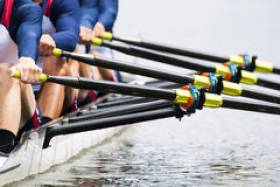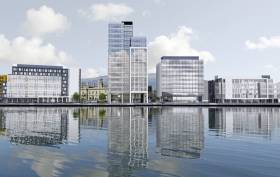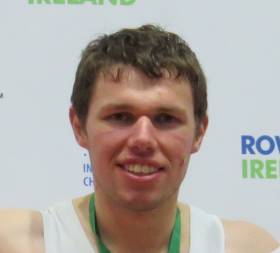Displaying items by tag: Belfast
Belfast Ponds Closed After Fatal Outbreak of Avian Flu
A number of dead aquatic birds have been removed from a former reservoir in Belfast following an outbreak of avian flu in Northern Ireland, as Breaking News reports.
Waterworks Park in North Belfast has been closed until further notice while the city’s council responds to the “ongoing issue” that saw 16 birds removed from the water in recent days.
It’s the latest in a series of cases of bird flu, whether confirmed or suspected, in both wild and farmed fowl across the region.
Last week some 27,000 ducks were culled after a suspected case of avian flu was detected at a business in Aughnacloy, Co Tyrone.
Waterworks park in Belfast closed till further notice as council attempts to deal with sick swans in the park. 16 dead birds have been recovered so far due to outbreak of bird flu. pic.twitter.com/JJyhONhBQw
— conor macauley (@TVconormac) December 8, 2021
According to Belfast City Council, Waterworks Park “an oasis for wildfowl. You can find greylag geese and mute swans, as well as mallards, tufted ducks, coots, pochards, goldeneyes, cormorants and great-crested grebes in the park.”
Breaking News has more on the story HERE.
'Lost' Kayak Sparks Belfast Coastguard Search
In early June, an inflatable kayak that had been seen washed onto rocks at Orlock near Groomsport on the North Down coast sparked a full search of the area by Bangor Coastguard Rescue Team, Portaferry CRT, the Donaghadee Saxon Lifeboat and the Bangor B Class Atlantic 8 Lifeboat.
The kayak was in very good condition and had not been there for long. On arrival at the location, the team took photographs and sent them to Belfast Coastguard after which a full search was requested.
Belfast Coastguard also made a Facebook appeal for the owner and as the search unfolded the owner was located safe and well. The kayak had been lost earlier in the evening due to an incident, but no one was injured.
The team took the kayak back to the car park for collection by the owner who was given advice. Bangor CRT emphasises, " If you lose an object in or near the sea report it to the Coastguard. Thanks to the members of the public that rang 999".
Crowley a Six Shooter at World Masters Regatta
#Rowing: Denis Crowley of Commercial brought his tally of wins to a remarkable six after three days at the World Masters Regatta in Budapest. In just one day, the 57-year-old won in the coxless four and twice in the single sculls – in the C class (43 years or more) and the E class for 55 or more. The decision to form composite crews again paid off for the Irish, with wins in the C eight and the D coxed four, along with Crowley’s haul.
World Masters Regatta, Budapest, (Selected Results, Irish interest, winners)
Friday
Men
Eight
(C – 43 or more): Heat Four: Commercial, Cork, Neptune, Clonmel, Shannon, Galway, Castleconnell (B Crean, B Smyth, R Carroll, O McGrath, G O’Neill, P Fowler, B O’Shaughnessy, K McDonald; cox: M McGlynn) 3:09.75.
Four
(E – 55 or more) Heat Five: Commercial, Neptune, Belfast BC, Galway (D Crowley, G Murphy, C Hunter, A McCallion)
Four, coxed
(D – 50 or more) Heat 3: Galway, Neptune, Castleconnell, Clonmel (G O’Neill, O McGrath, B O’Shaughnessy, T Dunn; cox: M McGlynn) 3:35.89.
Sculling, Single
(C - 43 or more) Heat 19: Commercial (D Crowley) 3:49.92.
(E – 55 or more) Heat 8: Commercial (Crowley)
Irish Composite Crews Lead the Way at World Masters
#Rowing: A composite of five crews – Galway, Neptune, Commercial, Clonmel and Cork – won in the men’s eight for 50 and over at the World Masters Regatta in Budapest. It was one of a sequence of wins for the Irish at the huge event.
Brendan Smyth and Patrick Fowler, rowing for Commercial, won the Pair in the A class, while Denis Crowley and Tony Corcoran won in single sculls.
Two C fours (43 or more) won and an E coxed four (55 or more) also took the honours.
World Masters Regatta, Budapest, (Selected Results, Irish interest, winners)
Wednesday
Men
Four, coxed E (55 or more) – Heat Four: 1 Belfast BC, Commercial, Galway, Leichhardt RC (C Hunter, A McCallion, M Heavey, G Canning; cox: JM Marks) 8:05.40
Thursday
Men
Eight (D – 50 or more) – Heat Two: Galway, Neptune, Commercial, Clonmel, Cork (B Crean, B Smyth, R Caroll, O McGrath, G O’Neill, P Fowler, D Crowley, G Murphy; cox: M McGlynn) 3:05.06.
Four (C – 43 or more): Heat Three: Commercial, Galway, Clonmel, Neptune (R Carroll, O McGrath, P Fowler, G O’Neill) 3:15.28. Heat Six: Commercial/Neptune (D Smyth, F O’Toole, G Murphy, D Crowley) 3:15.54.
Pair (A – 27 or more): Heat Three: Commercial (P Fowler, B Smyth) 3:32.68
Sculling, Single – (D – 50 or more) – Heat 15: Commercial (D Crowley) 3:55.15.
(H – 70 or more) – Heat Eight: 1 T Corcoran 4:27.08.
The Titanic Hotel in Belfast has been awarded the title of 'Northern Ireland's Leading Hotel 2019' at the World Travel Awards.
The hotel writes The Belfast Telegraph was given the award at a ceremony in Madeira, Portugal on Sunday evening.
The awards honour excellence within the hotel industry and the standard of service the hotel has demonstrated to visitors throughout the year.
Titanic Hotel’s General Manager Adrian McNally said his team were "thrilled" with the win.
"There are so many great hotels in Northern Ireland now, the standard here is very high, so to win this award means a lot to the staff and team at Titanic Hotel Belfast," he said.
For more on this prestigious travel award click here.
The above photograph Afloat adds are the Titanic Drawing Offices the oldest part of the former shipyard building that dates from the Victorian era.
Work on building is due to start this month, writes The Irish News, on the north's tallest building, creating over 500 local construction jobs.
The £50 million Belfast City Quays 3 office scheme, granted planning permission in January, will accommodate 1,800 people once complete and represents Belfast Harbour's largest development project to date.
The construction contract for the 16-storey building has been awarded to Dunmurry-headquartered, Farrans and is due for completion by the end of 2021.
The project, designed by Belfast-based architects RPP, will be built to the BREEAM Excellent sustainability standard, placing it in the top 10 per cent of sustainable new buildings in the UK.
The latest portion of the 20-acre City Quays waterfront scheme, which is already home to 1,100 office workers, will bring total investment up to £125m from Belfast Harbour. The development is already home to two Grade A offices a 900-space multi-storey carpark and the AC Marriott Hotel.
For more on this former docklands waterfront development click here.
Colaiste Iognaid Edged Out by Methody at Irish Schools' Regatta
Queen's Shine at Lagan Scullers' Head of the River
#Rowing: Queen’s had a good day at the Lagan Scullers’ Head of the River in Belfast on Saturday. Sam McKeown was the fastest single sculler in the first head, and was most closely matched by three other men from his college club. Queen’s also had the fastest quadruple and double on the day.
Lagan Scullers’ Head, Saturday (Draft Results; selected)
Head One: 1 Queen’s (S McKeown; men’s senior single) 12 mins 15.8, 2 Queen’s (M Taylor, sen single) 12:49.7, 3 Queen’s (R Corrigan) 13:03.9; 5 Enniskillen RBC jun 16 double (T Murphy) 13:12.6, 7 Enniskillen jun 15 coxed quad (D Howe) 13:16.1; 15 Methody (C Purdy; jun 18A single) 14:13.8; 30 Bann (K Shirlow; women’s intermediate single) 15:06.3, 31 Belfast BC jun 18A women’s double (S Gordon) 15:07.8. 60 Coleraine GS (G Lenaghan; women’s jun 15 single) 16:36.6.
Head Two: Queen’s men’s sen quad (M Taylor) 11:01.3; 3 Methody men’s jun 16 quad (T Fleming) 13:08.1; 8 Enniskillen jun 18 double (J Timoney) 14:29.2; 9 Bann (A Christie; inter single) 14:31.1; 16 Belfast BC women’s jun 16 coxed quad 15:05.7; 19 Queen’s (R Smylie; women’s sen single) 15:28.3; 25 Belfast BC (L McCoy; women’s jun 18A single) 16:16.5; 27 Belfast RC (K Foster; men’s club two single) 16:24.8. 34 Carrick on Shannon women’s jun 15 quad 17:07.1. 36 Belfast BC women’s novice double 17:16.0; 42 Enniskillen (L Paton; men’s jun 15 single) 17:35.5. 51 Queen’s (C Hagan; men’s nov single) 18:30.4
Head Three: 1 Queen’s men’s sen double (H Moore) 12:30.4, 2 Enniskillen RBC jun 18A quad (J Timoney) 13:07.8; 7 Belfast BC women’s jun 18A quad (P Mullan) 14:13.3; 10 Methody men’s jun 18B coxed quad (A Waly) 14:31.0; 15 Carrick on Shannon (T Ó Donaile; men’s jun 16 single) 15:41.0, 16 Coleraine GS men’s jun 15 double (O Leitch) 15:41.9, 19 Belfast BC women’s jun 16 double (K Dick) 15:59.8; 40 Lagan Scullers’ women’s jun 15 double (E Darby) 17:04.4.
McNamee and Shirlow Fastest at Lagan Scullers Head
#Rowing: The Lagan Scullers Head in Belfast saw Michael McNamee of Queen’s University, competing as a senior, set the fastest time for a single sculler. Katie Shirlow of Bann, an intermediate, was the fastest women’s single sculler, with a time of 15 minutes 3.7 seconds.
Belfast RC and UCD join Hosts in Taking Titles at Portadown
#Rowing: Portadown had an excellent day at their own regatta, taking the men’s Club One eights final. Bann, who also did very well, took the women’s club two eight. Belfast Rowing Club took the women’s senior quadruple title and UCD the men’s club one coxed quadruple. On a day where the wind became an increasingly important factor, some of the junior 14 and junior 15 events had to be cut.
Portadown Regatta (Selected Results)
Men
Eight – Club One: Portadown bt RBAI 4l. Jun 16: RBAI bt CGS ¾ l. Masters: Neptune (D) bt BRC A (E) easily.
Four – Masters, coxed: Belfast RC B (F) bt Belfast RC (D)
Sculling, Quadruple – Club One, coxed: UCD bt RBAI 5l. Novice, coxed: Newry bt RBAI 4l. Jun 18A: Portadown B bt Portadown A 3l. Jun 16, coxed: Bann bt Portadown 2¼ l.
Double – Club One: Portadown B bt UCD B 2½ l. Jun 18A: Portadown A bt Portadown B 3l. Jun 16: Bann bt Portadown 3l. Masters: City of Derry (D) bt Portadown (E) 1½ l.
Single – Inter: UCD (Earley) bt Portadown (Laivins) 1½ l . Club One: Carrick (Earley) bt Bann (Christie) 1 ft. Nov: City of Derry (Begley) bt RBAI (Gowdy) dist. Jun 18A: Portadown (Hull) bt CGS (Moore) 4l. Jun 16: Portadown (Pinkerton) bt Bann (O’Donovan) 2¼ l. Masters: City of Derry (D’Urso; E) bt Portora (Murphy; E) ½ l.
Women
Eight – Club Two: Bann bt Neptune 1l.
Four – Masters, coxed: BBC (E) bt BRC B (C) 5l.
Sculling, Quadruple – Sen: BRC bt Carrick 6l. Club One, coxed: Portadown bt Belfast BC 6l. Jun 16, coxed: Bann bt Portadown A 5l. Masters: Belfast BC (E) bt Portadown (C) 6l.
Double – Club One: Portadown bt Belfast RC ¾ l. Jun 18: Belfast RC bt Belfast BC 5l. Jun 16: Bann B bt Bann C 3l. Masters: Lagan (C) bt Portadown (C) dist.
Single – Sen: Bann (O’Donovan) bt Portadown (Kells) 6l. Club One: Bann (O’Donovan) bt Portadown (Canniford) dist. Jun 18A: Bann (Carson) bt Carrick-on-Shannon (Duggan) 3 ft. Jun 16: Bann (Breen) bt Neptune (Clarke) dist.

































































